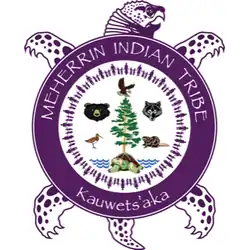Meherrin Indian Tribe
The Meherrin Indian Tribe is a state-recognized tribe and nonprofit organization in North Carolina. Its members identify as descendants of the Meherrin people. This group is not federally recognized as a Native American tribe.[2]
 Official seal of the Meherrin Indian Tribe | |
| Named after | Meherrin people |
|---|---|
| Formation | 1976,[2] incorporated: February 15, 1977[1] |
| Founded at | Winton, North Carolina[3] |
| Type | state-recognized tribe, nonprofit organization |
| Foundation: EIN 56-1394419 [4] | |
| Purpose | Cultural, Ethnic Awareness (A23)[4] |
| Location |
|
Membership (2022) | 900[5] |
Acting Chief | Jonathan Cadill[6] |
Revenue (2021[6]) | $85,454 |
| Expenses (2021[6]) | $49,050 |
Staff | 0[6] |
| Website | meherrinnation |
The Meherrin Indian Tribe says their autonym is Kauwets'a:ka, which translates to "People of the Water."[7][8]
Organization
The Meherrin Indian Tribe was founded in 1976 and incorporated a 501(c)(3) nonprofit organization on February 15, 1977.[2][1] George E. Pierce of Winton, North Carolina, is the registered agent.[1]
The officers as of 2021 were:
- Acting Chief: Jonathan Caudill
- Secretary: Dorthy McAuly
- Treasurer: Tomika Brown
- Counncilman: Jerome James.[6]
They have more than 900 members.[5]
Identity
In the 1990s, the member claimed descent from Sallie M. Smith Lewis (ca. 1844–1904), who they described as "the last full-blooded Meherrin Indian."[2] In 2011, they identified as descendants of Meherrin people who they said lived on Potecasi Creek in North Carolina.[2] The historical Meherrin people were last described as living in North Carolina in 1763.[2] The proposed finding by the Bureau of Indian Affairs Office of Acknowledgment found that "evidence does not demonstrate that Sallie M. (Smith) Lewis or the historical landowners allegedly near Potecasi Creek were Indian, Meherrin Indian, or members of a Meherrin Indian or other Indian tribe."[2]
State-recognition
The State of North Carolina designated the Meherrin Indian Tribe as state-recognized tribe in 1986.[2]
Petition for recognition
In 1995, the Meherrin Indian Tribe filed a petition with the Bureau of Indian Affairs for federal acknowledgment of existence as an Indian tribe.[3] The proposed finding by the Office of Federal Acknowledgment (OFA) declined their petition and ruled that "The petitioner has not documented, nor has the OFA identified a historical Indian tribe, or tribes that combined, from which its members descend."[2]
Activity
The Meherrin Indian Tribe hosts an annual powwow[4] held on their dance grounds between Ahoskie and Murfreesboro.[9] They also maintain a garden.[6]
The Z. Smith Reynolds Foundation and Franklin P. and Arthur W. Perdue Foundation have given grants to the Mehrrin Indian Tribe.[6]
Notes
- "Meherrin Indian Tribe". OpenCorporates. Retrieved March 13, 2023.
- Washburn, Kevin K. (January 23, 2014). "Proposed Finding Against the Acknowledgment of the Meherrin Indian Tribe" (PDF). Federal Register. 79 (15): 3859–60.
- Deer, Ada E. (May 1, 1996). "Receipt of Petition for Federal Acknowledgment of Existence as an Indian Tribe" (PDF). Federal Register. 61 (85): 19314. Retrieved March 14, 2023.
- "Meherrin Indian Tribe". GuideStar. Retrieved March 15, 2023.
- Caudle, Hollyann (November 30, 2022). "People of the Water: The Meherrin Tribe". The Tribune. Retrieved March 15, 2023.
- "Meherrin Indian Tribe". CauseIQ. Retrieved March 15, 2023.
- "Joelle Joyner". National Museum of the American Indian. Retrieved March 15, 2023.
- Shujaa, Kenya J.; Shujaa, Mwalimu J., eds. (2015). The SAGE Encyclopedia of African Cultural Heritage in North America. Los Angeles: SAGE Publications. p. 498. ISBN 9781483346380.
- Bryant, Cal (October 11, 2022). "Meherrin Tribe ready to celebrate their heritage". Roanoke-Chowan News-Herald. Retrieved March 15, 2023.